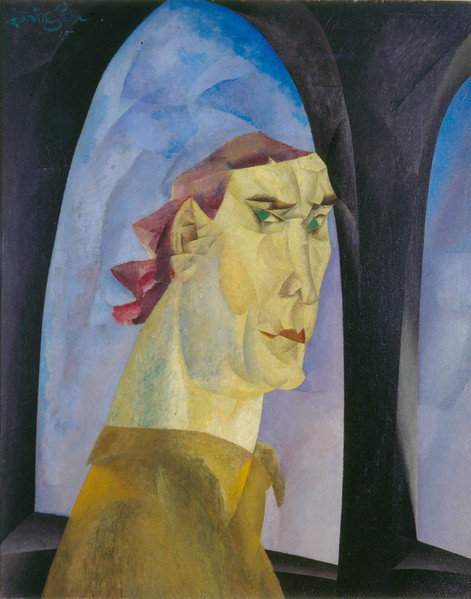Lyonel Feininger
30 Jun - 16 Oct 2011

Lyonel Feininger (1871–1956)
Self-Portrait (Selbstbildnis), 1915
Oil on canvas
39 1/2 × 31 1/2 in. (100.3 × 80 cm)
Sarah Campbell Blaffer Foundation, Houston © 2011 Artists Rights Society (ARS), New York/VG Bild-Kunst, Bonn
Self-Portrait (Selbstbildnis), 1915
Oil on canvas
39 1/2 × 31 1/2 in. (100.3 × 80 cm)
Sarah Campbell Blaffer Foundation, Houston © 2011 Artists Rights Society (ARS), New York/VG Bild-Kunst, Bonn
LYONEL FEININGER
At The Edge Of The World
30 June – 16 October, 2011
orn and raised in New York, Lyonel Feininger (1871–1956) moved at the age of sixteen to Germany, where he became one of the leading practitioners of German Expressionism and the Bauhaus. In the late 1930s, when the Nazi campaign against modern art forced him to flee back to New York after an absence of fifty years, his marriage of abstraction and recognizable imagery made him a beloved artist in the United States. Long acknowledged as a major figure of the Bauhaus, Feininger is renowned for his romantic, crystalline paintings of architecture and seascapes. Less well known are the whimsical aspects of his work: his pioneering Chicago Sunday Tribune comic strips; his figurative, Expressionist compositions; his photographs; and his miniature hand-carved wooden figures and buildings, known as City at the Edge of the World. This retrospective is the first in Feininger’s native country in more than forty-five years, and the first ever to include the full breadth of his art.
The exhibition will be accompanied by a richly illustrated monograph with a feature essay that provides a broad overview of Feininger’s career, tracing his relationships with movements and organizations that defined the development of modern art, including Cubism, the Blaue Reiter, the Blue Four, the Bauhaus, and Black Mountain College. Additional essays focus on Feininger’s comics, his photographs, his musical compositions, and his reputation in Germany.
At The Edge Of The World
30 June – 16 October, 2011
orn and raised in New York, Lyonel Feininger (1871–1956) moved at the age of sixteen to Germany, where he became one of the leading practitioners of German Expressionism and the Bauhaus. In the late 1930s, when the Nazi campaign against modern art forced him to flee back to New York after an absence of fifty years, his marriage of abstraction and recognizable imagery made him a beloved artist in the United States. Long acknowledged as a major figure of the Bauhaus, Feininger is renowned for his romantic, crystalline paintings of architecture and seascapes. Less well known are the whimsical aspects of his work: his pioneering Chicago Sunday Tribune comic strips; his figurative, Expressionist compositions; his photographs; and his miniature hand-carved wooden figures and buildings, known as City at the Edge of the World. This retrospective is the first in Feininger’s native country in more than forty-five years, and the first ever to include the full breadth of his art.
The exhibition will be accompanied by a richly illustrated monograph with a feature essay that provides a broad overview of Feininger’s career, tracing his relationships with movements and organizations that defined the development of modern art, including Cubism, the Blaue Reiter, the Blue Four, the Bauhaus, and Black Mountain College. Additional essays focus on Feininger’s comics, his photographs, his musical compositions, and his reputation in Germany.
